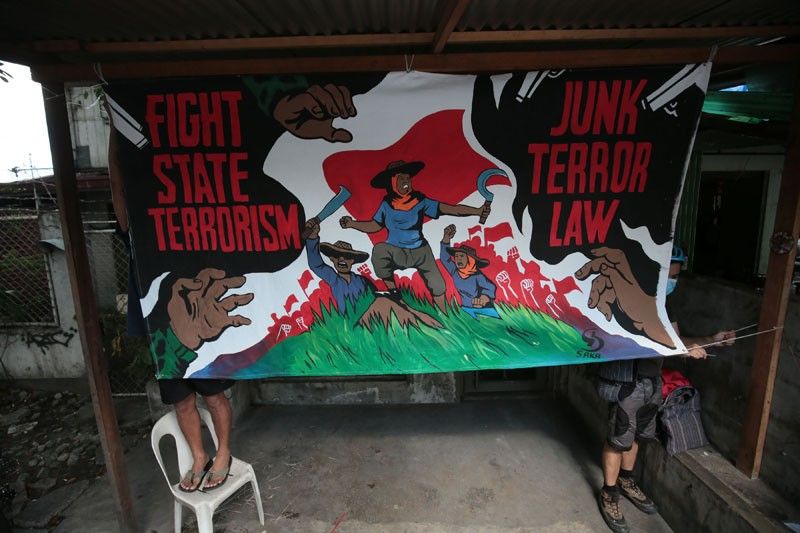AMLC to Philippines: Implement new anti-terror law

MANILA, Philippines — The Anti-Money Laundering Council (AMLC) said the Philippines should effectively implement the recently enacted Anti-Terror Act and also amend the country’s anti-money laundering law to avoid sanctions from Paris-based global watchdog Financial Action Task Force (FATF).
AMLC yesterday said the Philippines has an opportunity to implement Republic Act 11497 or the Anti-Terror Act (ATA) of 2020 signed by President Duterte last July 3 and demonstrate progress in fulfilling the country’s international commitments.
“It must be remembered that it is not enough to pass the ATA into law because the Philippines is being assessed both on technical and effectiveness compliance. The country must also demonstrate effective implementation of the ATA before the observation period ends in February 2021,” AMLC said.
The STAR earlier reported the country’s observation period under the Asia Pacific Group on Money Laundering has been extended to February next year due to the coronavirus disease 2019 (COVID-19) pandemic.
The council is required to submit a comprehensive report on the progress in implementing the recommended actions after a review in April. The FATF would decide in June 2021 instead of February 2021 whether or not the Philippines would be included in the watchdog’s gray list.
The AMLC said the same attention and commitment must be given to proposed amendments to Republic Act 9160 or the Anti-Money Laundering Act (AMLA) of 2001 to address the shortcomings in its anti-money laundering/counterterrorism financing (AML/CTF) system.
It warned failure to pass and implement the amendments to the AMLA, as amended, before next February would have similar effects wherein the Philippines would be placed in the FATF International Cooperation Review Group gray list.
“If the Philippines fails to enact the necessary amendments and demonstrate effective implementation of the same, it will be gray-listed. FATF shall then publicly identify the Philippines as a high-risk jurisdiction with strategic AML/CTF deficiencies,” the AMLC added.
Countries currently included in the gray list are the Bahamas, Botswana, Cambodia, Ghana, Iceland, Mongolia, Pakistan, Panama, Syria, Trinidad and Tobago, Yemen and Zimbabwe, while Iran and North Korea are included in the black list.
“Gray-listing will have a negative impact on the reputation of the economy and the cost of doing business with its citizens, both as an individual and a juridical entity,” it said.
The Philippines was blacklisted by the FATF in 2000 for failing to address “dirty” money issues, paving the way for the enactment of AMLA in 2001. The country was removed from the blacklist in February 2005.
It narrowly avoided being placed on blacklist in 2012 as it criminalized terrorist financing and pursued quicker freezing of suspect accounts.
The AMLC said gray-listing comes with reduced investor and lender confidence, which may result in limited access to banking or financial services.
Likewise, gray-listed country would need to raise its borrowing rates, both internationally and domestically, to attract a lender, while investors are expected to demand higher interest rates.
If included in the gray list, AMLC explained the European Union would require member-countries to immediately impose enhanced due diligence on Filipino nationals and businesses, entailing additional costs and paperwork or justification, pushing banks and financial institutions to do a cost-benefit analysis in determining whether or not to continue doing business.
The additional costs would naturally be charged to Filipino nationals including overseas Filipino workers and businesses in the form of higher interest rates or higher processing fees, while additional paperwork and justifications mean delays in processing transactions.
Duterte’s opinion
Sen. Panfilo Lacson clarified that President Duterte’s declaration that the Communist Party of the Philippines-New People’s Army (CPP-NPA) are terrorist groups was just an opinion and not official.
“If in declaring a group, organization or association as a terrorist organization, the President is referring to its proscription, there is a judicial process involved, meaning full-court intervention via the Court of Appeals (CA), complete with due notice and hearing,” Lacson said.
Lacson said under the Anti-Terrorism Act of 2020, only the CA could order the proscription and not the Anti-Terrorism Council (ATC) nor the President.
“Further, the burden of proof lies with the Department of Justice (DOJ). Even membership in a proscribed terrorist group goes through the same due process which the DOJ has to prove,” he added. Cecille Suerte Felipe, Delon Porcalla, Evelyn Macairan
- Latest
- Trending

























